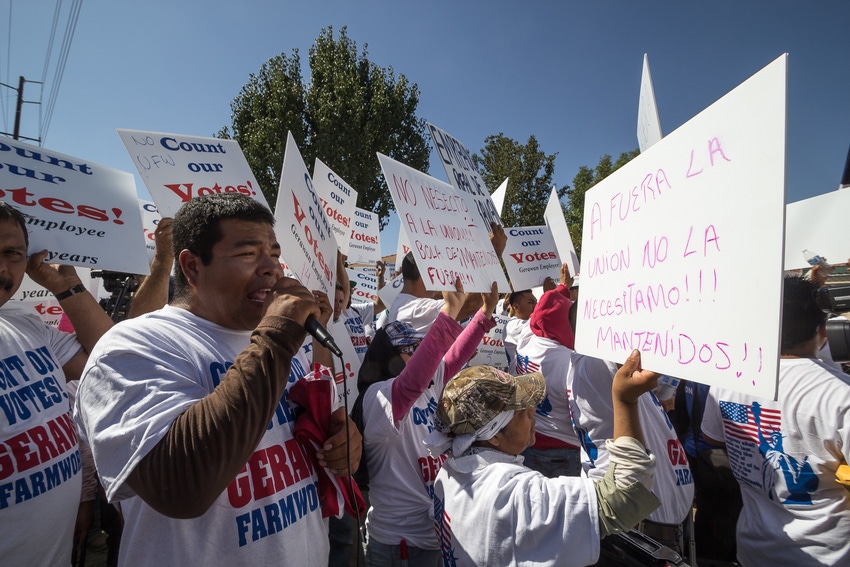
The California Supreme Court recently sided with an Agricultural Labor Relations Board decision to ignore “abandonment” claims made by Gerawan Farming in its lengthy argument to have a 1990 vote by employees to join the United Farm Workers Union UFW).
In a decision filed Nov. 27, the state Supreme Court reversed a court of appeals decision, remanding any further decisions to the lower court consistent with Supreme Court opinion. The Fifth District Court of Appeal decision declared the state’s mandatory mediation and conciliation unconstitutional, setting aside the ALRB’s order to force collective bargaining.
In short, the collective bargaining agreement written by a state mediator must be accepted by Gerawan according to the state Supreme Court, paving the way for UFW representation of about 3,000 employees, according to a statement by the UFW.
Gerawan attorney David Schwarz says the state Supreme Court decision does not prevent ballots currently impounded from being counted. It’s those ballots, cast in 2013 that Gerawan employees want counted as they claim it will support their effort to “decertify” the UFW as their representative in collective bargaining.
Quick history
Gerawan employees voted in 1990 in favor of UFW representation. This led to negotiations that stalled for unstated reasons in 1995. From 1995-2012, the union did not respond to Gerawan or its employees. This became the heart of Gerawan’s “abandonment” argument after the union returned to the bargaining table in 2012 with no explanation as to its 17-year absence.
In late 2012 the UFW returned to the negotiating table for a series of meetings that ended several months later with the union invoking a 2003 “mandatory mediation and conciliation” process which allows a state mediator to force a contract between the union and the employer. The process gives employers or the employees represented no rights to participate, propose, alter, or refuse a contract.
In 2013, Gerawan employees asked the ALRB to allow them to hold a vote to determine if employees at that time wanted to continue under UFW representation, or effectively “decertify” the union. Gerawan maintains that a petition with over 2,600 signatures asked the ALRB to allow such a vote, but the ALRB refused, claiming that 100 of the signatures were “forged.”
A vote was later held, but those ballots were impounded by the ALRB after the UFW successfully sought to prevent the votes from being counted. Those votes have allegedly still not been counted.
Federal lawsuits followed as Gerawan employee Sivia Lopez sued the ALRB on civil rights charges. This led to the Fifth District Court decision to declare the 2003 state’s “mandatory mediation and conciliation” statute unconstitutional and set aside the ALRB’s forced collective bargaining agreement. The state Supreme Court overturned that decision.
What now?
In a statement by the UFW, Gerawan is now on the hook for $10 million in back wages to the employees, of which 3 percent goes to the union for dues.
Gerawan maintains the issue is not yet settled as the Supreme Court decision does not address the right by employees to vote for decertification. A lower court ruling is pending to force the counting of ballots impounded after the 2013 vote. Moreover, Gerawan has indicated it will take the entire case to the U.S. Supreme Court.
As all this was happening, California Assemblyman Jim Patterson, R-Fresno, introduced legislation in 2015 to give farmworkers rights they currently do not have: rights to attend and monitor all mandatory mediation meetings held by the ALRB so they can understand terms of their contract; the ability to approve or decline those terms; and, the requirement to nullify a union contract if the union abandons workers for three or more years. The bill was killed in committee.
Patterson says he intends to reintroduce the legislation, adding that it could be tweaked from what he introduced in 2015. His goal is to allow farmworkers rights to negotiate their own contracts and eliminate the forced collective bargaining agreements now afforded to state mediators who he says are “unelectable and unaccountable.”
“If nothing more, I am going to force the Democrats in charge of the ALRB to take a good, hard look at what they are doing to the farmworkers they say they care about,” Patterson said. “I think it is unconscionable that people who claim to care about farmworkers would deny them the opportunity to vote on their own contract.”
About the Author(s)
You May Also Like






